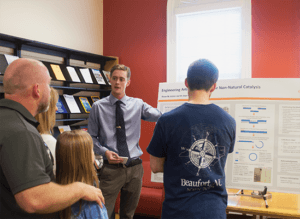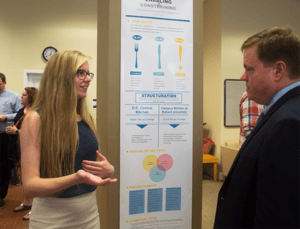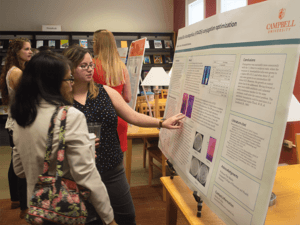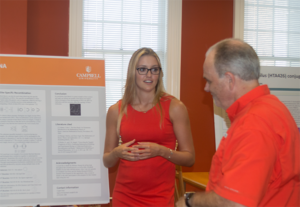Campbell’s first summer Student Research Fellows Program welcomed its pilot cohort to campus in late May. This afternoon, the program concluded with student presentations of their research in biochemistry, engineering, pharmaceutical science, mathematics and communication.
The new program was introduced by Mark Hammond, provost and Vice President for Academic Affairs, at the 2018 Academic Symposium.

“Student Research Fellows helps accomplish two significant goals of the university: fulfilling our strategic plan and maintaining excellence in student learning,” Hammond said. “In many cases, student research serves as a springboard into productive and prestigious graduate and professional research.”
While the summer pilot was limited to undergraduate students, it is the result of an initiative in Campbell’s Strategic Plan that is working to establish research programs for all undergraduate, graduate, and professional students.
Students worked with faculty mentors for five weeks, attending weekly progress meetings and interdisciplinary gatherings to discuss their research progress and share challenges and ideas. Of the six students presenting, five plan to continue their research the following term.

Dylan Gooch, an engineering student, will utilize the result of his research for the rest of his Campbell career. He and his faculty mentor built a prototype that will be used in the engineering annex to teach students about thermodynamics.
“The model shows how heat travels, and it displays concepts that all engineers need to be familiar with,” said Gooch. “It will help engineers confirm numeric data, understand the concept of radiation in practice and visualize linear curves in the data they calculate.”
Gooch was joined in Wiggins Memorial Library by classmates he’d met with all summer in progress report meetings. The students kept each other up to date on their research throughout the program, even though they worked in vastly different subject areas from DNA structure to social impact.

Faculty mentor: Dr. Dean Farmer
Shane Galvin engineered metalloproteins and plans to enter the testing stage of his research in the fall. Philip Oji studied protein interactions that could help screen molecules for proteins thought to cause Huntington’s disease. Caroline Wilson’s project on the influence of programs like Campus Kitchen on urban and rural areas with food insecurities could be appreciated by biologists and English majors alike.
The ability to relate their summer research to students and mentors with entirely different backgrounds of study was a main takeaway from the program, especially for pharmaceutical science student Nikala St. John.

“It was a really great experience,” she said as she explained her study of bacteria and its ability to make the enzymes and proteins heat-stable (likening the bacteria cells to “factories” for the non-scientists in the room). “I spent quality time in the lab, but I also learned to talk about my work to people from different disciplines and to appreciate other people’s fields of study.”
Logan Gray’s project on mathematical knot theory application in DNA structure was a testament to the cross-curricular nature of the program.
“My interest in the topic came from a conference I attended at UNC Charlotte,” said Gray. “I’m fascinated by knot theory as a mathematics major, I had a background in biology from AP in high school that allowed me to float in this area. I got to spend a lot more time with biology than my major usually calls for.”

The program offered financial support to students and their faculty mentors with a stipend, allowing them to spend the summer on campus utilizing Campbell facilities. Hammond spoke to the value of student-driven research on Thursday.
“I am delighted that our summer student research fellows program has been launched this year,” he said. “Pairing our students with a faculty mentor allowed them to conduct high impact, engaging research. Moreover, the students learned to interact as a cohort as they shared their research outcomes.”
The summer research fellows will present their projects and further findings at the 2019 Wiggins Memorial Library Academic Symposium.
Student/Faculty Award Recipients
Shane Galvin, Biochemistry
Engineering Artificial Metalloproteins for Non-Natural Catalysis
Faculty mentor: Dr. Evan Reynolds
Dylan Gooch, Engineering
Developing a Small-Scale Heat Transfer Radiative Experiment and Model for Classroom Implementation
Faculty mentor: Dr. Jacqueline Burgher
Logan Gray, Mathematics
The Study of Knot Theory and its Applications
Faculty mentor: Dr. Brittany Hansen
Philip Oji, Pharmaceutical Sciences
Development of an In-Vitro Methods using Fluorescence Resonance Energy Transfer to Study Protein-Protein Interactions
Faculty mentor: Dr. Stephen Sharkady
Nikala St. John, Pharmaceutical Sciences
G. kaustophilus Conjugation Optimization
Faculty mentor: Mr. Tim Marks
Caroline Wilson, Communication Studies
Integrating Assets: Positive Deviance Potential in the Campus Kitchens Project
Faculty mentor: Dr. Dean Farmer

